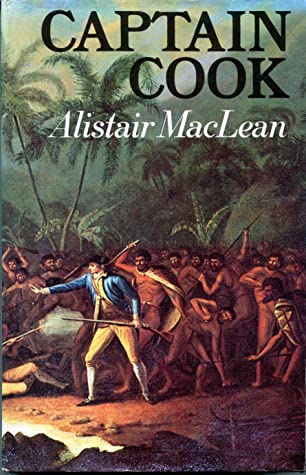

 |

|

The average rating for Captain Cook based on 2 reviews is 4.5 stars.
Review # 1 was written on 2019-09-02 00:00:00 J C Larimore J C LarimoreAlthough born in obscurity, James Cook became the greatest combination of seaman, navigator and cartographer that the country had ever known. His three voyages around the world between 1768 and 1779 saw him explore the Pacific Ocean, chart the coasts of New Zealand, although missing the harbour that became Wellington, explore the eastern coast of Australia, although missing the harbour that became Sydney, explore the Great Barrier Reef, travel thousands of miles in an attempt to find the North West Passage, sail the coast of North America, navigate the Bering Strait and venture further south than any other man had ever done in his quest to prove, or otherwise, the existence of Alexander Dalrymple's contention that there was a Great Southern Continent. [MacLean suggests that missing those two later important harbours was probably due to the fact that he sailed past them in the dead of night.] Once he had made his name known, he was gripped by a boundless passion for new horizons and all along the way he claimed territory for Great Britain and named, or even renamed, practically every place and promontory that he discovered, usually naming them after some important person or place in Great Britain; indeed he was the greatest namer of places in history. On his travels he regularly visited Tahiti, where he was much loved and respected, indeed, he became a committed Tahitian. In addition he had a special connection with Hawaii where he was also held in great esteem. Sadly his end came there on 14 February 1799 at Kealakekua Bay when he took a landing party to sort out some relatively minor indiscretions by the natives, including stealing a canoe and some of the armourers tools. Ironically, he was later reported as saying by one of his crew on the eve of his death, 'I am afraid that these people will oblige me to use some violent measures: for they must not be left to imagine that they have gained an advantage over us.' The following morning Cook and some armed marines went ashore, a fight broke out and Cook was killed. The man who had said, 'I, who had ambition not only to go further than anyone had done before, but as far as it was possible for man to go ...' was dead. He was buried at sea on 22 February as his ships, the Resolution and the Discovery made their way home, after once more investigating the Berring Strait and the Arctic with no more success than Cook had the previous summer. Alastair MacLean has produced a fine, comprehensive, graphic and lively biography in his usual chatty and eminently readable style. It is without doubt as thrilling as many of his novels, of which I found the first I read, 'The Guns of Navarone', to be one of the finest. |
Review # 2 was written on 2011-08-02 00:00:00 Alvin Manz Jr Alvin Manz JrNow this is a history book. Just 184 pages printed on that old-fashioned thick vellum (actually, I don't know if it's vellum, I just wanted to use that word) and plenty of pictures. And maps. Alistair MacLean wrote "Ice Station Zebra", one of my favorite movies, and "The Guns of Navarone". Here, he gives us a quick, no-nonsense history of Captain James Cook beginning with the fact that we really don't know anything about him. There were really no surviving family members and what writing (over a million words, according to MacLean) Cook left behind, is entirely a journal of his activities; it says nothing about the man himself. Indeed, he only mentions his wife twice, and one of those times incidentally. So what does MacLean write? Just the facts that are known, in the order that they happened. For the average lay person, this is all one would really need to know. He sailed further and for longer than any other man, went places no other man had gone before (and, in some cases, since). He named about ten zillion bodies of land and claimed it all in the name of England, even if someone already owned it. In between, MacLean takes shots at all the other books on Cook, claiming (I don't know if he is correct or not) that anything beyond what he wrote is simply supposition on the part of the author. For example, at one point, after Cook lands in Tahiti, MacLean says something to the effect of "if this were a typical Cook biography, I would go on for about twenty pages about how beautiful and wonderful Tahiti is." However, he points out, no one really knows what it was like and besides, it's irrelevant to the Cook story. So he says, basically, "Cook landed on Tahiti. Next..." Quick, fun read, in my opinion. |
CAN'T FIND WHAT YOU'RE LOOKING FOR? CLICK HERE!!!